Stories of Masters Ep. 1 — Victor Seguinot
March 30, 2022
In this episode, Victor Seguinot, the Head of Security, recounts his 29 years of experience in the NYPD.
Read more about the death of officer Guidice he mentions here.
Podcast Credits:
- The podcast was recorded on Feb. 28
- Music by Max Peters
- Editing by Ellie Yang
DISCLAIMER: This podcast contains some graphic descriptions of violent death.
Transcript
Everyone has a story. The stranger you sit by in the subway, the figure in the office window, and all the others you have grown to overlook. This podcast aims to highlight the stories in the Masters communities that although important, are often unnoticed. From security guards to maintenance staff, these are the people who play a big role in making Masters what it is, and these are their stories.
Mr. Seguinot was born in 1960 in the bronx nyc. He joined the security team as head of security in 2019 and can often be seen patrolling campus in his black security windbreaker. Before joining the Masters community, Mr. Seguinot worked in the NYPD for 29 years across departments. He started his career at the 50th precinct and worked his way up with training and dedication.
I went to hunter college. Um, didn’t have a real degree that will take me somewhere else. And I was doing retail wholesale for 10 years. And so I said well, I didn’t like being a white collar worker.
So I went to the blue collar industry, which is sanitation court, officer police, officer fire department. So I applied to some different agencies and the police called me first. I was 27 when I took the test and I got on the job when I was 30 years old.
For some people, being a police officer is generational, something that was passed down through the family. But Mr. Seguinot was the first one in his to become a cop, and has since inspired family members to pursue a similar career. However, he found the job to have a highly political nature and said that he wouldn’t recommend it for his children.
I enjoyed it.
It was a good experience, but would I recommend that to my son? no. it’s a very political job, extremely political. It’s not what you see on TV. I’m going to tell you that right now, it’s not about chasing people down, arresting them, or shooting at a car passing by, nothing like that at all. In the movies that you see, they only showe the negative part of it. And, um, we do a lot of community work. There’s a lot of fun things that we do. And we do people who realize that we, when something happens in the case where a child was killed and we make money to bury this child, because the parents going to work for of a report, whatever Christmas time we get presents to go to hospitals and distribute them, we would distribute presents in other countries and people are not aware of that.
And it’s a sad part of it because the news is very guilty of making them look like that because they had the opportunity to do that. Sometimes they do. They should do more positive stories about us i nstead of negative, they’ll take an incident that happened. And it was dragging for four months and then a year, you know, because he has a high profile.
I get that. But there’s a lot of good that goes, you know, and unfortunately people who to see us as human when we get killed, you know, that’s what happened. Recently, those two cops got killed. Then they’d be like, wait a minute. They’re not super cops, they’re humans like us.
When September 11 came along – And I was involved with that too I worked at that time. The greatest thing about that whole year, it was this one year, was the support we have and what came, the people were coming from other states, from other countries. It lasted a year. And the city, you know, there was sign pro science for us, and then it went back to normal.
Do you have one experience in your career as a police officer that jumps out to you?
I, um, I got a job. I was the second to report with my supervisor, to the Metro north at Spuyten Duyvil in the Bronx. Uh, a woman got hit by a train with him.
She was with her boyfriend. They were both lawyers. People take shortcuts from Spuyten Duyvil to get to the northern part of the Bronx, Riverdale central. And, um, when we got the call she was already a hit. And this man’s approaching me and my Sergeant, we called up the Metro north to let them know to shut power. Because the difference between an elevated train and a ground train is that the elevated train you can hear because the metal rattles as it’s passing by, but with ground trains, the ground absorb the sound.
Sure enough hey didn’t cut off the pilot. That’s near my site and I almost got hit by another train. So we managed to get out the way in time to let the train pass by. We pulled up again. I needed to shut up everything. So I said, we’re getting there to the section where the women lied, and I’m walking towards this man.
He’s walking towards us. Um, he’s talking to us, but he’s in shock. So what comes out of his mouth sounds like baby talk. There’s no rhyme or reason to this word, it’s bizarre. And I’m looking at him and I see on his shirt and down his pants what looks like reddish pink matter. So I finally have somebody tend to him and one ambulance got there. Then we get to this rock where the women was.
Um, so what happened was that people don’t realize this about trains. The tracks are like this, right? But the train comes out another five feet away from the track cause that’s where the seating areas are. So a lot of people mistake the width of the track for the width of the train. And don’t really visualize how wide these trains are. And also when the trains are coming in, the Metro north trains are very fast, they’re turning the corner, they create a wind gust that actually pulled you in. Another problem that tends to be on the right side or left side of the train on the curved side.
She’s on the curved side and he’s on one side waiting for the train to pass by. The train passes by and she’s not there. So he looks for her. And um, now I know where the pink matter came from.
She was on the rocks below, there was a river that, you know, she was… I don’t want to get you disgusted. You see stuff and it stays in your mind for a long time.
And you have to sorta, like I said, put it aside and do your job.
So she was on the rocks. Um, hery looks like every bone in her body was broken because it just looks like it wasn’t the right form anymore. In like a human form. Um, one of her eyes was up in, you know, her skull, and a piece of skull was missing here, and the back of her skull was missing. And on another rock, the skull was there was her hair, so it was, uh, pretty disgusting.
And then we, you know, my guys had to go down there bring it up. So the pink matter from the man’s pants came from when he tried to revive her. He’s in shock and he tried to revive her. Actually, he probably put her body on his lap, trying to revive her. And that’s where, you know. And then you could see her pocket book hanging on the rock, the platform which is around before she hit the rocks down there. The big rock, there were a lot of rocks.
So that’s probably one of the things I remember the most because we got there minutes after it happened. And when we think about that, maybe a couple of minutes ago, she was alive. You know, and her life was just instantly gone, you know, and this man, you know, we don’t keep in touch with them, but you know, definitely needed a lot of therapy after that. And, um, and you see stuff like that. You see so many cases of different things where homicide, suicides.
So someone killed someone or they kill themselves and, and, you know, people shot and you know, people in accidents and you know, and, um, so that’s why, you know, the sort of things that you read on screen and the TV shows, you know, that human side of you know, of life, you know, it always reminds how short life is and how important it is to enjoy every day of your life
He also told another story, one that was more personal to him.
The other thing I think, uh, that was more personal to me, was this young man right here, Vincent Guidice He was 27 years old. He passed away.
He pointed at a picture he had pinned by his desk of a young officer, Vincent Guidice, simlling in his uniform. The image is in the photo gallery.
I remember the day because I was an administrator and I was asking him about a report he did with his partner. They were young 27 years old and he was goofing around. They were waiting to do what they call a mustard, mustard means that you stand up in front of your supervisor, he checks your uniform, tells you what your assignment is, you know? So there he was at the mustard with all of the command, and he was 27 year old, he was just goofing around, and I’m trying to get their attention to let me know what they need to report to. So I finally got the attention. So I left, it was daytime and he was working a evening shift.
I get a call home that he was in the hospital. What happened was he responded to a domestic violence incident in the Bronx. And, um, the man had trashed the apartment. That’s why the police got there. The wife called. When they get there everything was broken furniture, glass and stuff like that.
So he’s resetting rest. So they were struggling with him, with his partner to get him. But, Vincent, falls back and on top of him, and the process, a piece of glass from the stuff he trash cuts into his thigh. So he was bleeding out. So at that point, his partner puts pressure on it and he stabilizes him and he goes to the hospital. He stabilized until 12 midnight. So I’ve been getting calls all night, making sure, and I go back to the command. So they told me stabilized, it’s good.
I wake up the next morning and I go to work. Like, that’d be that seven o’clock in the morning, my regular chore. When I get there, I see all these police cars from different commands, we’re the 50, but 43, 47, 49 precinct. Then I feel in front of the command, the purple and they called them bundts., the purple and black bundts. And for some stupid reason I didn’t relize that it was him. Then I realized because I see some of my coworkers crying, and then I realized he didn’t make it.
Because of him though, because of his death, the law changed. When you fight with a cop in a situation like that, that man didn’t go to jail because he died, he went to jail for domestic violence. Yes. He only got a minor charge for resisting arrest. Because of his death, we lobbied and went to Albany, year after year, his mother and his brother, his brother’s a nurse, his girlfriend, his fiance, and we fought to change the laws.
So any time now that you fight with a cop and it causes a great injury of any kind, it’s a felony charge, it’s no longer a misdemeanor charge. And we named this three run in front of the command after him. So it was, so that was, um, back in the 90s when it happened.
After 29 years on the force, Mr. Seguinot decided to retire from the job. He said that the decision came to him naturally, that he just knew it was time.
Prior to me coming here uh, in 2019 I retired from the police department, July 31st. My, uh, sister passed away and my step-mom passed away.
And two of my friends on the police department committed suicide. So it was a bitter of sweet retirement, you know. It was like a very rough year and I was, uh, retired already. I was home for nine months and I said to myself, you know, I need to do something to help out my kids more with college, and I need a social life and to feel a little bit more.
It’s important that, uh, you guys are, um, uh, starting to feel this the right way, you know, because we, uh, we don’t want to, you know, we’re here to support you. We’re here make sure that your transition from young adulthood to adulthood is clear and your path is clear and that you could feel safe and, um, you know, secure in what you’re doing
Uh, tough world, tough job. So you see what happened in Ukraine. Old people, you know, kids, no parents. And like I said, there’re like 20 kids dead already, maybe more, you know, it’s a tough world. That’s why you kids have to make a change. Only through you, the young people, is this country going to change, and maybe the world. The future, with the law, with education, whatever you’re involved with, that’s all part of what changes society.
So I appreciate what you guys do.
Mr. Seguinot says that he will be staying at Masters for the years to come.
There are 955 members at Masters, and behind each digit is a story. Together, they form the Masters community, our community.
This has been the Stories of Masters podcast with Ellie Yang, reporting for Tower. Thank you for listening.



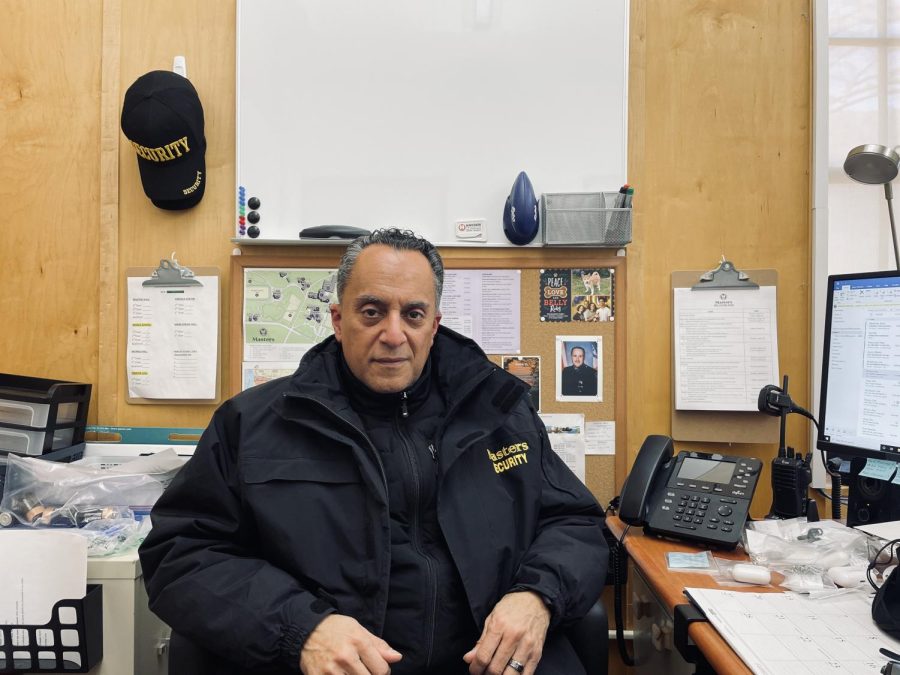
















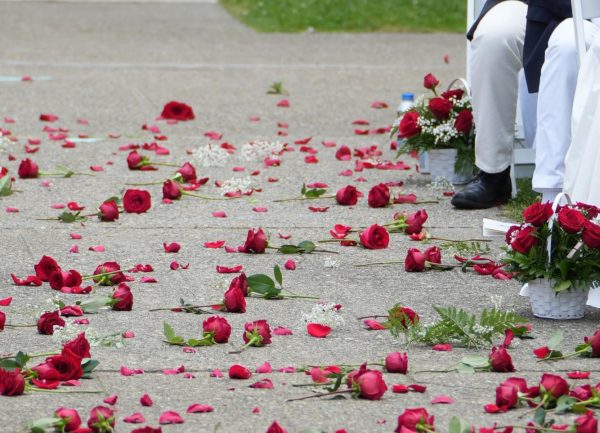
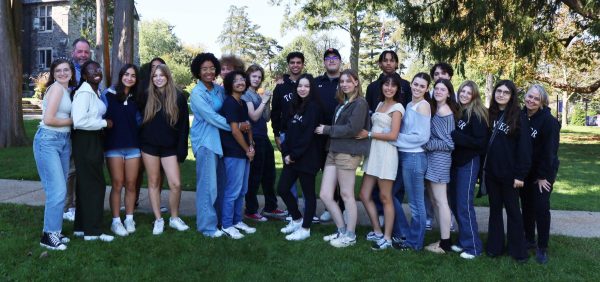
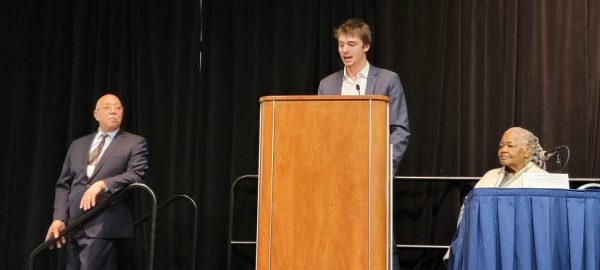
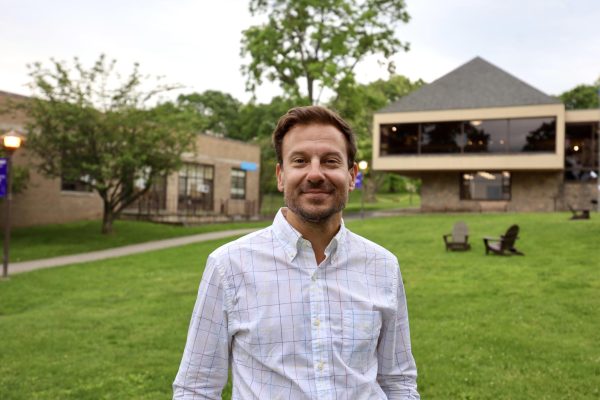
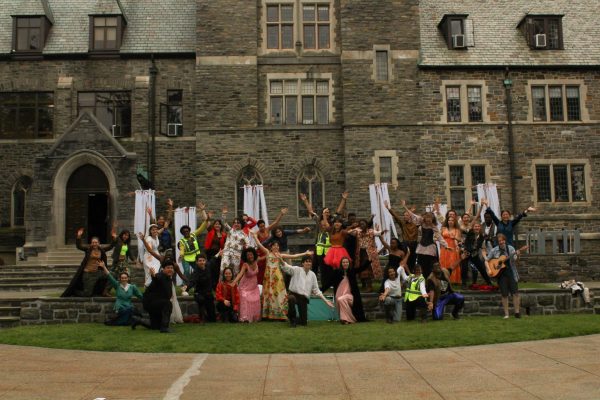
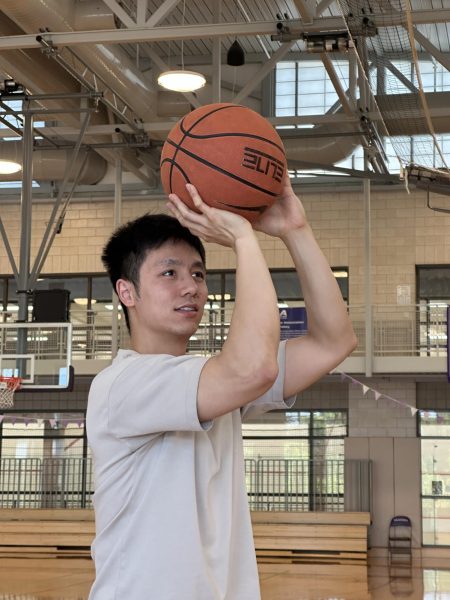

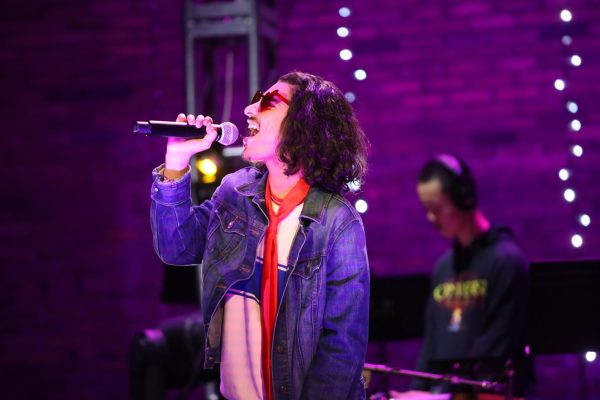
Madeline Seguinot • Mar 31, 2022 at 9:12 PM
Ellie and the Tower staff, thanks for taking the time to get to know the members of the Masters community! This was a great podcast!